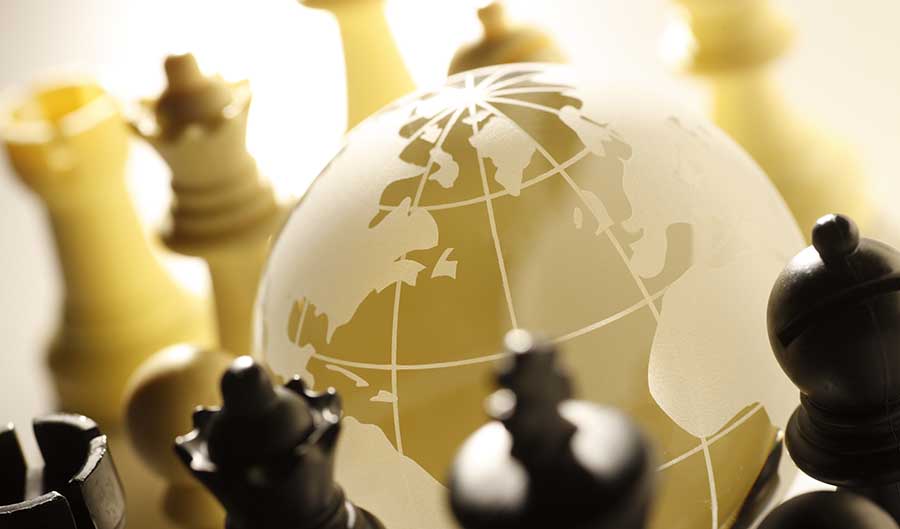
Wu Xinbo, Director of the Center for American Studies, Fudan University
Jan 12, 2023
The United States lacks the strength and influence to simultaneously contain both China and Russia. As with the Iraq and Afghanistan wars, its policies will place it in strategic overdraft and lead to more strategic errors.
Richard Javad Heydarian, Professorial Chairholder in Geopolitics, Polytechnic University of the Philippines
Jan 11, 2023
Geopolitical tensions unleashed by the war in Ukraine continue to influence Sino-American relations and the reshaping of state relationships in Southeast Asia.
James Hinote, Geopolitical Strategist
Jan 11, 2023
President Xi Jinping’s recent visit to Saudi Arabia seeks to disrupt the U.S.’ influence in the region and deepen relationships with one of the largest oil exporting countries in the world, with the signing of multiple agreements. Each move put more pressure on the U.S. to reevaluate its relationship with Saudi Arabia.
Jan 05, 2023
On January 4, 2023, Ambassador Qin Gang, Minister of Foreign Affairs of China, published an article on The Washington Post. The following is the full text as posted on the website of the Chinese Embassy in the United States. On Dec 31, 2022, Qin, 56, was appointed the new foreign minister, replacing Wang Yi. Qin was named China's ambassador to the U.S. in 2021.

Feng Zhongping, Director, Institute of European Studies, Chinese Academy of Social Sciences (CASS)
Dec 29, 2022
The notion of decoupling has lost steam across Europe, though some countries are still looking to reduce their dependence on China. How Europe chooses to balance cooperation with competition will be the key as the two sides cooperate in areas of shared interest.
He Wenping, Senior Research Fellow, Charhar Institute and West Asia and Africa Studies Institute of the China Academy of Social Sciences
Dec 29, 2022
At second U.S.-Africa Leaders Summit in December, the American side made a general point of avoiding talk about China, even though the subject came up here and there. African leaders would not likely want to be seen as geopolitical pawns.

Li Yan, Director of President's Office, China Institutes of Contemporary International Relations
Dec 28, 2022
A review of China-U.S. relations in 2022 shows a shift toward a new duality in American strategic thinking that may dominate for a long time. Communication between national leaders has brought new hope for stability, but now the world is watching to see if their points of agreement can be put into practice.
Leonardo Dinic, Expert in Geopolitics and International Business, the Future of Work, and Emerging Technologies
Dec 22, 2022
As the U.S. seeks to advance its position and strengthen the U.S. dollar global dominance, it is also facing challenges and an anti-hegemonic sentiment from other states. Events such as the war in Ukraine, tensions between the U.S., Russia, and China, as well as new strategic partnerships developed between China and Europe, Latin America, and Africa, are driving forces in the shift of balance of power to non-Western nations.
Wu Zhenglong, Senior Research Fellow, China Foundation for International Studies
Dec 17, 2022
Members of the European Union have not taken kindly to the U.S. Inflation Reduction Act, which tilts the business playing field against them. Subsidies are encouraging some businesses to move their operations to North America, and the political heat is palpable.
Zainab Zaheer, Development Consultant
Dec 17, 2022
The historic meeting between Joe Biden and Xi Jinping was short on resolutions, but gave promise for those hoping for a toned down approach to the bilateral tensions that have plagued the two nations since the middle of the 2010s.
Back to Top

- China-US Focus builds trust and understanding between the U.S. and China through open dialogue among thought leaders.
- Our Offerings
- Topics
- Videos
- Podcasts
- Columnists
- Research Reports
- Focus Digest
- Stay Connected
-
Thanks for signing up!
- Get the latest stories from China-US Focus weekly.